What it is
The concept of time off is not defined in the Labor Code
The Labor Code of the Russian Federation does not provide a precise definition for time off. However, the legislator establishes situations in which an employee, working beyond the established time or on weekends, receives the right to appropriate incentives. One of them is an additional day off.
Note! Despite the fact that the concept of time off is not provided for in the Labor Code of the Russian Federation, it can be defined as follows - an additional day of rest that is provided to an employee for working beyond the established schedule, including on weekends and holidays.
In fact, time off is a colloquial term that involves missing work for a valid reason. This concept can also be considered as the use of the working time established by the work schedule according to the decision of the employee himself. However, time off should not be combined with a weekend or holiday. The exact amount of working time is determined by the production calendar compiled for each year.
Employee benefit
The nuances of payment for extracurricular work activities are discussed in Art. 153 TK:
- a day off or holiday on which an employee is called to work is paid at least twice as much;
- if a person wants to take time off as a day off, then the worked day off is paid as a regular worker, and the time off is not paid at all.
Therefore, it is often more profitable for the employee himself to receive double payment. However, there are times when a person may need an extra day to resolve personal issues, then it makes sense to take a day off.
For an employer, the option of providing an extra day off to an employee is preferable to additional payment costs.
Moreover, if the employee takes time off in the same month when the off-hours absence occurred, then the amount of payment for the month will not change, but if in the next month, then the employee will receive less for that month (the amount of payment for one working day).
Reasons for receiving
The process of applying for required time off involves first of all establishing the grounds for this. The most common reasons for receiving an additional day of rest are the following situations:
- the employee performs labor functions in good faith and in excess of established duties;
- overtime recorded in the report card;
- work on weekends and holidays;
- funeral of a close relative, serious illness;
- employee participation in the donor program;
- the need for rest due to overload at work, including emotional;
- undergoing a medical examination;
- obtaining education in parallel with work;
- business trip affecting legal rest days;
- urgent need caused by events such as a wedding, the birth of a child, a summons to a court hearing and other circumstances.
Despite the protection of the legislator, in most cases an employee has to rely only on the employer and his loyalty. In addition, a particular enterprise may have local regulations regulating the issue of receiving time off.
Speaking about specific provisions of the Labor Code of the Russian Federation, we can define several categories of persons who receive time off, regardless of whether the manager agrees to it or not. For example, in accordance with Article 128 of this law, WWII veterans can receive 35 days of compensatory leave per year.

A blood donor has the right to be granted time off
Decor
The algorithm for taking time off from work is as follows. In order for the employer to initiate its provision, the employee must write an application addressed to the employer. Let’s say Ivanov I.I. is entitled to time off for previously worked time, so he writes a statement with the following content:
“Please give me time off on 08/10/2020 for working on a day off, 08/01/2020.”
Based on the application, the employer issues an order in the T-6 form or in free form, which the employee is introduced to under his signature.
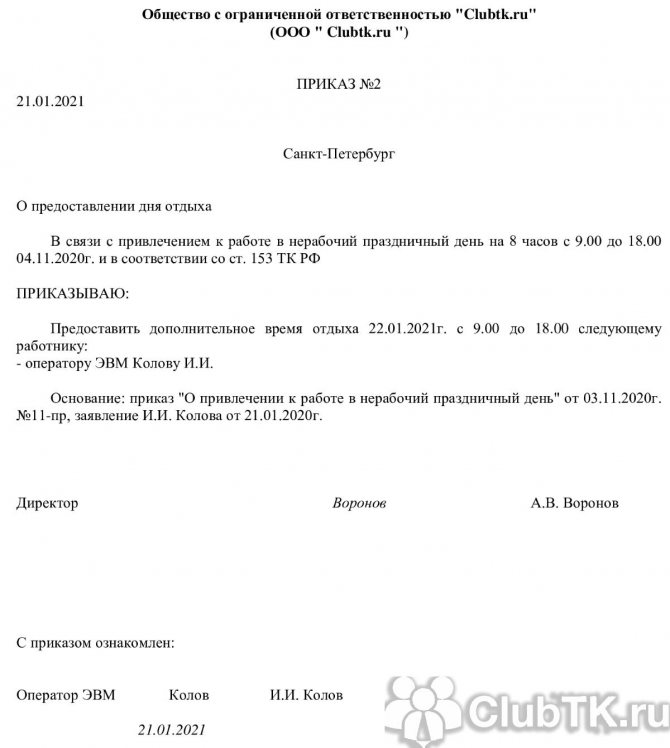
In the time sheet, the employee’s day off is marked with the letter OZ or the digital code 17.
Read more: How to write an application for vacation for previously worked time
Sometimes employers do not understand or do not want to understand how to apply for time off for working on a day off, and provide it to employees without preparing any documents, including an order. In this case, the letter designation I or the digital code 01 is placed on the time sheet.
Read more: Designations and codes in the time sheet
But this practice of violating the rules creates risks of liability for the organization. If something happens to an employee on this day, the employer will respond to the fullest extent of the law, including those regulating relations in the field of labor protection. By covering up an employee in this way, the employer actually commits forgery of documents, and this is already a criminal offense, liability for which is provided for in Article 292 of the Criminal Code of the Russian Federation in the form of imprisonment for up to 4 years.
When you can’t refuse an employee
In addition to the above provisions of the Labor Code of the Russian Federation on persons who receive time off, regardless of the will of the employer, practice has created cases in which refusal is also not allowed. These include the following circumstances:
- marriage by an employee (can be granted 3 days);
- funeral of a close relative (also up to 3 days);
- donations;
- fact of overtime work, including on weekends and holidays (confirmation of this fact in the report card is required).
Recording time off in documents is necessary primarily for calculating wages. The report card will also act as proof of overtime if the employer wants to deny additional rest.
When is the best time to take them?
The period for using additional days off earned outside of school hours is best agreed upon immediately with the employer.
Since the law does not establish a period when time off can be taken, the parties themselves negotiate the nuances of the period of provision.
Based on a compromise solution, the employer, by written agreement of the employee, issues an order to involve him in work overtime and indicates the period for using rest days.
At the request of the employee, these days can be added to the next vacation.
In this case, the HR department must receive the following documents:
- notification of the employee about overtime work, which contains his signature confirming his acquaintance;
- an employee’s application for an additional day off during a certain period or specific date;
- an order requiring overtime hours, indicating the conditions for granting time off.
You can learn more about how to take time off for donating blood from our article. How many days off are allowed per year? See here.
Is it possible to take time off due to illness? Information is here.
The document options can be found in the examples below.
Example of an employee notification:
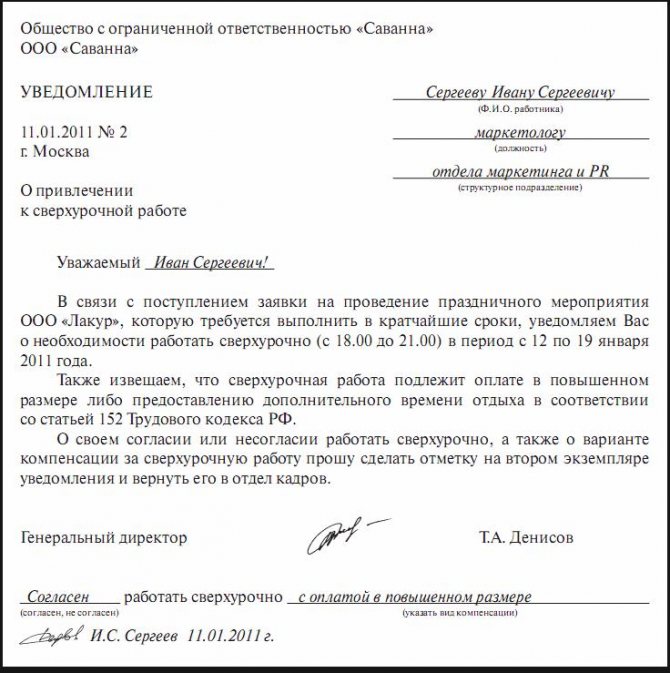
Sample notification
Example of an employee statement:
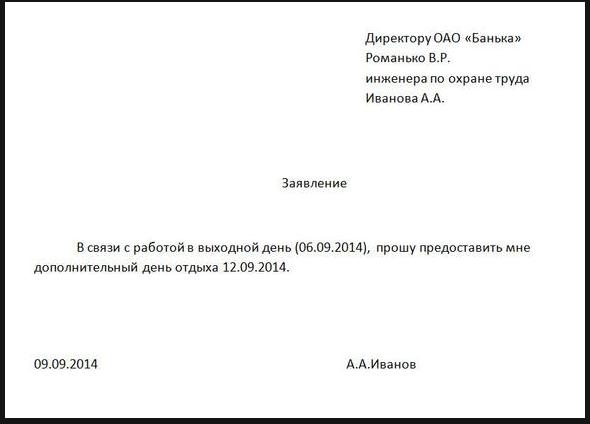
Sample application for leave
Example of an order:
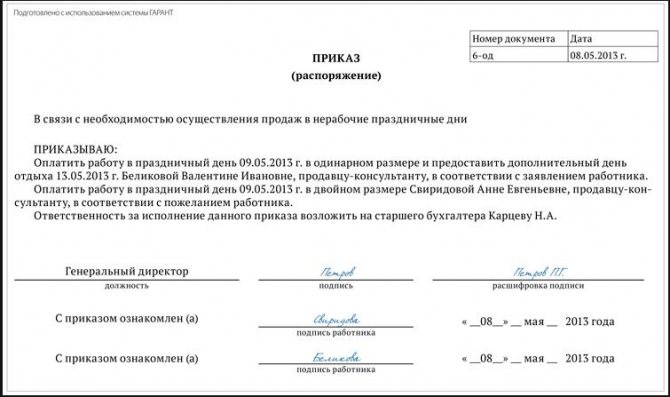
Sample order for inviting an employee to work overtime
Mandatory time off
The application of the procedure for granting an employee time off requires an assessment of the circumstances giving the right to this. To simplify the procedure, the Labor Code of the Russian Federation provides the following provisions:
- Article 128 of the Labor Code of the Russian Federation. Provides time off for pensioners (14 days per year), parents and spouses of military personnel who died as a result of their duties, disabled people (60 days per year), participants in the Great Patriotic War (35 days per year), also the basis may be a wedding, funeral and childbirth (up to 5 days per year).
- Article 173-173.1, 174 of the Labor Code of the Russian Federation. The right to time off has been established for university and college students for a period of 10 days to 4 months. Provided if necessary to pass entrance exams, intermediate and final certification, or defend dissertations.
- Article 262 of the Labor Code of the Russian Federation. An additional day off is provided for women working in rural areas (1 day per month).
- Article 263 of the Labor Code of the Russian Federation. Establishes the right of parents raising two or more children under 14 years of age, or a disabled child under the age of eighteen, as well as single mothers and fathers with a child under 14 years of age. Number of days off – 14 per year.
- Article 286 of the Labor Code of the Russian Federation. There is a procedure for providing additional days of rest to an external part-time worker if the vacation at the main job is longer. The number of days is determined taking into account the vacation period.
- Article 319 of the Labor Code of the Russian Federation. Establishes one day off per month for persons who work in the Far North and are raising a minor child (under 16 years old).
The above cases do not imply refusal on the part of management. In other situations allowing time off, the employer's consent will be required.

The Labor Code defines a specific list of cases when the employer is obliged to provide time off
Time off at your own expense
If an employee does not have established grounds for taking additional time off, then he receives the right to leave without pay or administrative leave. This is what allows an employee to miss a day of work without the threat of absenteeism. However, the Labor Code of the Russian Federation considers this concept only as unpaid leave. It is regulated by Art. 128 Labor Code of the Russian Federation.
Management may refuse such leave if it considers the reasons presented to be unjustified. The employee submits an application, which is drawn up in free form. After this, the employer makes a decision.
Note! By law, every employee, regardless of the reasons, has the right to leave without pay for an annual period of fourteen days. Exceeding the specified period is possible with the consent of management.
Leisure without pay should not be confused with situations where time off is needed to cover overtime. The grounds for additional leave directly affect the fact of remuneration. For example, if a person worked on a day off, he can receive either an additional day off or monetary compensation. However, if a person needs a couple of days due to a medical examination or other similar circumstances, then there is no provision for saving wages.
Can I take time off as a vacation?
There is no official concept of “time off” in the Labor Code of the Russian Federation, but it is generally considered to be the temporary absence of an employed citizen from the workplace in agreement with the employer. Based on Art. 125 of the Labor Code of the Russian Federation, each person is provided with an annual paid vacation of a minimum amount of 28 calendar days, and he can use it either fully or partially.
Article 125 of the Labor Code of the Russian Federation - Division of annual paid leave into parts. Review from vacation
By agreement between the employee and the employer, annual paid leave can be divided into parts.
Moreover, at least one part of this leave must be at least 14 calendar days. Recall of an employee from vacation is permitted only with his consent. The part of the vacation unused in this regard must be provided at the employee’s choice at a time convenient for him during the current working year or added to the vacation for the next working year. Employees under the age of eighteen, pregnant women and employees engaged in work with harmful and (or) dangerous working conditions are not allowed to be recalled from vacation.
If an employee needs time off, he must agree with the employer. In this case, he will be able to get 1 or 2 days off work, and this will not be considered absenteeism. If this is not done, there is a possibility of being fired from the workplace due to a long absence without prior approval.
Important! The possibility of receiving paid time off depends on the decision of the manager and the situation at work. If there are no valid reasons for a one-day leave, the employer has the right to refuse this, provided that the employee’s absence will create problems for the company.
However, there are exceptions in which time off is mandatory, but in this case it will be unpaid.
Financial compensation
Labor legislation does not provide for the concept of time off, and, accordingly, the procedure for their payment. However, taking into account the fact that a number of days off are equivalent to leave without pay, we can conclude that additional days off are not paid even if there are good reasons. An exception that confirms this rule is donation, in which the employer is obliged to provide the employee with paid days for rest and recovery.
Another option when an employee can receive monetary compensation instead of time off is overtime. However, in practice the choice between additional time off and financial payment is made by the employer. That is, it is possible to refuse compensation and issue an additional day of rest. This is done in order to save money on the part of management, but this cannot be fully considered a violation.

For going to work on holidays or weekends, you can receive time off or monetary compensation.
Also in practice, you can receive compensation upon dismissal. The calculation will be carried out in accordance with established standards in a particular organization. If an employee takes a day off after working a full shift, then the payment will be appropriate.
Refusal of compensation
As stated above, material payments towards the required time off are not provided for by labor law. This fact gives the employer the right to determine the compensation regime for employees if overtime is recorded. That is, working on weekends for time off according to the Labor Code does not oblige the management of the organization to provide compensation; it may, at its own discretion, refuse to pay money. You shouldn't get into an argument over this. Full cash for unused vacation is possible only upon dismissal.
Also, when establishing separate reasons for time off (wedding, funeral, medical examination), monetary compensation is not provided at all. That is, if the employee demands to pay money, for example, for three days allocated for a wedding, he will receive an unequivocal refusal. The exception is the category of employees who are entitled to a certain number of days off directly according to the Labor Code of the Russian Federation.
Do I need to pay?
To answer the question of what time off is under labor law, you need to analyze the norms of the Labor Code of the Russian Federation and law enforcement practice. The concept of time off according to the Labor Code of the Russian Federation does not exist, but we are accustomed to using this word when we are talking about leave without pay or additional days off on account of the next annual paid leave. But if an employee does not take advantage of the right to rest in a timely manner, does he have the right to demand compensation for unused time off upon dismissal?
The Samara Regional Court had to resolve this issue. The claim was filed by an employee who had accumulated 41 days off for previously worked time, and he did not receive double pay from the employer. For the days that were not used, the former employee planned to receive compensation upon dismissal. He believed that payment for time off for working on a day off is calculated on the same principle as payments for unused vacation are calculated.
But the judges disagreed. The Appeal Determination No. 33-7034/2020 dated June 11, 2019 states that the Labor Code of the Russian Federation does not contain a rule requiring payment of compensation for unused time off. And although the Labor Code of the Russian Federation does not clearly indicate what time off is, it cannot be equated to vacation, which is what the employer did by refusing to pay compensation.
Submission period
You can get days off for overtime, donation, and under other possible circumstances at any time while working in a specific organization. The law does not provide for a limitation period for registering time off. For example, if in five years of work a pensioner never takes advantage of additional rest, then in the sixth year of work he will have the opportunity to take seventy days off immediately. Thus, the days of compensatory leave do not expire and are retained by the employee until they are used or dismissed with monetary compensation.
How long can you take a day off?
If many days have accumulated, how long can the PTO be used?
It is important to remember that with the expiration of the calendar year, rest days received for overtime, donation and other reasons do not expire. Theoretically, an employee has the right to take time off at any time after receiving it. However, the more time passes, the more difficult it is to restore the chronology of the reasons for their provision. That is why the employee should not delay using the rest days required by law.
Registration procedure

Absence from work agreed with management must be documented.
When deciding how to arrange time off for an employee, it is enough to study the procedures for issuing a leave order. The procedure is similar. The employee and his management are required to go through several stages of registration:
- Compiling and submitting an application. This stage is implemented by the employee. You must submit your application in advance.
- Consideration of the application and making a decision. Management can refuse only in exceptional cases; in practice this does not happen. The only thing the employer can do is change the dates of rest if the specified circumstances allow it.
- Issuing an order. It is imperative to document time off and reflect the information on the timesheet. This will help in calculating wages and possible monetary compensation.
Regarding the preparation of the application, it should be noted that it is formulated in free form. There is no established pattern. It is enough to indicate the name of the manager, employee, state the reasons for the leave and its period. The application is registered, so it is appropriate to make two copies. The time period for consideration of the application has not been established, however, in practice the decision is made within two to three days.
Deadlines
The Russian Labor Code does not say when a person should use time off for previously worked time - the choice is completely left to him. In fact, you can use it several months after unscheduled working hours or days.
The only exception to this can be the case if the deadlines for their provision are stipulated in the internal regulations of the company, with which the employee was familiarized with when hired, or to which he signed, if the regulations were updated during the work process.
The number of days or hours of leave is directly proportional to the number of days or hours during which the employee was present at the workplace.
Taking time off at your own expense
Receiving rest without pay, that is, at your own expense, occurs according to the general rules. First of all, you will need to contact your employer. He must assess whether the employee has days to rest, and then consider the application for time off.
Note! It is not necessary to indicate the reasons for additional leave. It is enough to indicate that family circumstances or health conditions necessitate the need for days off.
If the basis involves time off without the possibility of refusal, then it is necessary to confirm the established reasons. During the medical examination, appropriate certificates are issued, and the donation is also supported by documents. The social status of employees, which gives them the right to additional rest, also requires official confirmation. At the same time, the subtleties of arranging a vacation at his own expense are determined by the employer by issuing local acts.
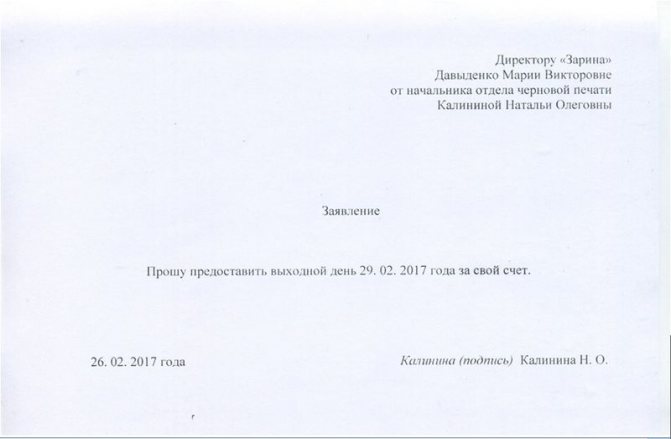
Application for time off at your own expense
How is time off paid for time previously worked?
If an employee decides to choose an additional day off instead of paying for overtime, he will not be paid, as mentioned above. The employee will receive money only for the days worked: that is, for the time that he went out or stayed extra. Roughly speaking, the days are simply swapped; this does not affect payment in any way.
In the case where the time off was taken as vacation pay, payment for it is made in accordance with the vacation pay that will be accrued. In accounting, special formulas are used for this.
Days off taken at your own expense are not paid. The employee himself takes responsibility for this.
What to do in case of refusal
Since there is no clear regulation of the registration of time off in labor legislation, there are also no reasons for refusing additional rest. However, it is possible to define situations based on the grounds formed by practice. Some of them, for example, production necessity, which does not allow releasing an employee without reasons according to the Labor Code of the Russian Federation, allow refusal.
If the employee is convinced that he was refused without reason or that the employer’s decision violates his rights, then the person has the opportunity to file a complaint with the Labor Inspectorate and even in court. However, the second option is more often used when it comes to unpaid monetary compensation.
In practice, such disputes are not considered. The difficulty lies in the lack of regulation of the Labor Code of the Russian Federation directly for the concept of time off and its features. When it comes to overtime that is recorded, it is possible and necessary to prove a violation on the part of the employer, but if, for example, time off is denied due to personal circumstances, then it is almost impossible to establish the guilt of the organization’s management.

If your employer refuses to grant you time off, you can go to court, but it will be difficult to prove your case
Thus, additional days off provided to employees can be issued on the basis of specifically defined grounds, either due to overtime, or due to the person’s special social status.
At the same time, the law does not regulate the time off system, which gives some freedom to employers in determining the procedure for registering and paying for unscheduled time off. Order a free legal consultation
How to properly register time off for vacation: step-by-step instructions
It is important to take into account that you cannot take time off on your own without the approval of the employer, so it is issued in exactly the same way as paid leave, since it is part of it:
- We are drawing up a statement. If we talk about paid time off for standard vacation, there is no need to indicate the reasons.
- We submit an application to the manager. He must sign it and submit it to higher management (if any). Then an order is issued and sent to the personnel department. The accounting department also receives the documents - on their basis, vacation pay is calculated.
- We receive vacation pay. They are calculated according to the above scheme, depending on average earnings and the number of days of rest.
Let's look at an example of how to arrange such a leave:
A woman works at OOO as a system administrator. On June 20, she learned that she urgently needed to go to a neighboring city on the 25th, therefore, she would have to take time off. To do this, she contacted her employer with a request to provide 2 days of unscheduled paid leave, verbally explaining to him the reason. The employer approved the time off and issued an order. Then the employee received all payments and started work on June 28.
How to write an application
The application is made in simple written form, only instead of the word “time off” you need to use the term “vacation”. What information will you need:
- Company name, full name and the position of manager;
- The title of the document is a statement, indicated in the middle of the sheet;
- Leave dates;
- Information about mandatory payment for all days;
- Date of compilation and signature of the employee.
The application is submitted in a single copy. It must be signed by the employer, which will mean his consent to provide several days of paid time off.








